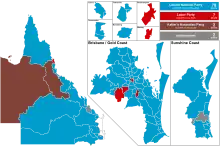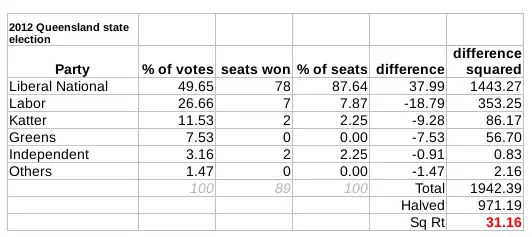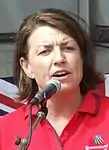2012 Queensland state election
The 2012 Queensland state election was held on 24 March 2012 to elect all 89 members of the Legislative Assembly, a unicameral parliament.[1]
| |||||||||||||||||||||||||||||||||||||||||||||||||||||
All 89 seats in the Legislative Assembly of Queensland 45 Assembly seats were needed for a majority | |||||||||||||||||||||||||||||||||||||||||||||||||||||
|---|---|---|---|---|---|---|---|---|---|---|---|---|---|---|---|---|---|---|---|---|---|---|---|---|---|---|---|---|---|---|---|---|---|---|---|---|---|---|---|---|---|---|---|---|---|---|---|---|---|---|---|---|---|
| Turnout | 91.00 ( | ||||||||||||||||||||||||||||||||||||||||||||||||||||
| |||||||||||||||||||||||||||||||||||||||||||||||||||||
 The top map shows the first party preference by electorate. The bottom map shows the final two-party preferred vote result by electorate. | |||||||||||||||||||||||||||||||||||||||||||||||||||||
| |||||||||||||||||||||||||||||||||||||||||||||||||||||
The Labor Party (ALP), led by Premier Anna Bligh, was defeated by the opposition Liberal National Party (LNP), led by Campbell Newman. It is only the sixth time that Queenslanders have ousted a sitting government since 1915. The ALP was attempting to win a ninth consecutive election victory, having won every general election since 1989 although it was out of office between 1996 and 1998. Katter's Australian Party contested its first election. Before the election, it held two seats whose members had been elected as LNP candidates.
Labor suffered one of the worst defeats of a state government since Federation, and the worst defeat of a sitting government in Queensland history. From 51 seats in 2009, it was reduced to only seven seats, suffering a swing of 15.6 percentage points. The LNP won a majority for the first time in its history, jumping from 34 to 78 seats to win the largest majority government in Queensland history. It was the first outright non-Labor majority since the Queensland Nationals won their last victory in 1986. Katter's Australian Party won two seats, though leader Aidan McLindon lost his own seat. The remaining two seats were taken by independents. Newman took office two days after the election.
Results
The estimated two-party preferred result was 37.2% for Labor and 62.8% for the LNP, a swing of 13.7% from Labor's result of 2009.[2]
The LNP had been unbackable favourites to win the election. By the time the writs were dropped, they had led opinion polling for over a year, and had been ahead of Labor on all but one Newspoll since 2010.
The LNP swept Labor from power in a massive landslide, taking 78 seats to Labor's seven on a two-party-preferred swing of 13.7 points away from Labor. The 44-seat loss is double the 22-seat loss suffered by the Nationals in the 1989 election, the previous record for the worst defeat of a sitting government in Queensland history. The 13.7-percent swing is one of the largest against a sitting state government in Australia since World War II.
In the process, the LNP won many seats considered Labor heartland. It broke Labor's longstanding grip on Brisbane, taking all but three of the city's 40 seats, some on swings of 10 points or more. By comparison, Labor went into the election holding all but six seats in the capital, which had been its power base for over 20 years. In every election since the "one vote, one value" reforms of the Goss government, Labor had won at least 30 seats in Brisbane. The LNP also won every seat on the Gold Coast while strengthening its hold on its traditional heartlands in provincial and rural Queensland. Ten members of Bligh's cabinet were defeated. Newman won Ashgrove handily, defeating Labor's Kate Jones on a 13-point swing, almost double the 7-point swing he needed to take the seat off Labor.
ABC News called the election for the LNP at 6:48 pm Queensland time, less than an hour after counting began. Bligh conceded defeat at 8:25 pm, and Newman publicly claimed victory 20 minutes later.[3]
The day after the election, Bligh resigned as premier and Queensland Labor leader. She also announced she was resigning from parliament on 30 March and retiring from politics, triggering a by-election in her seat of South Brisbane.[4][5] An hour later, Newman, who at the time did not know that Bligh had resigned, announced that he would be sworn in as premier on 26 March, heading an interim three-man cabinet composed of himself, Seeney and Tim Nicholls. Although Newman's victory was beyond doubt, counting was still under way in some seats.[6] Bligh handed in her resignation later on the afternoon of 25 March, but remained as caretaker until Newman was sworn in the next day.
Labor was reduced to its smallest presence in the legislature on record, outdoing its previous low in 1974, when it was cut down to a "cricket team" of only 11 members at the height of Joh Bjelke-Petersen's power. Indeed, Michael Madigan of The Courier-Mail wrote that Labor had been reduced to a "water polo squad."[7]
Although Labor came up two seats short of official party status in the legislature, Newman promised that Labor would be "properly resourced as an opposition".[8]



|
Queensland state election, 24 March 2012 | ||||||
|---|---|---|---|---|---|---|
| Enrolled voters | 2,746,844 | |||||
| Votes cast | 2,499,612 | Turnout | 91.00 | +0.07 | ||
| Informal votes | 53,797 | Informal | 2.15 | +0.21 | ||
| Summary of votes by party | ||||||
| Party | Primary votes | % | Swing | Seats | Change | |
| Liberal National | 1,214,553 | 49.66 | +8.06 | 78 | +44 | |
| Labor | 652,092 | 26.66 | –15.59 | 7 | –44 | |
| Katter's Australian Party | 282,098 | 11.53 | +11.53 | 2 | +2 | |
| Greens | 184,147 | 7.53 | –0.84 | 0 | ±0 | |
| Family First | 33,269 | 1.36 | +0.54 | 0 | ±0 | |
| One Nation | 2,525 | 0.10 | –0.28 | 0 | ±0 | |
| Independent | 77,282 | 3.16 | –3.42 | 2 | –2 | |
| Total | 2,445,966 | 89 | ||||
| Two-party-preferred | ||||||
| Liberal National | 62.8 | +13.7 | ||||
| Labor | 37.2 | −13.7 | ||||
| * The two-party preferred summary is an estimate by Antony Green using a methodology by Malcolm Mackerras. | ||||||
Seats changing hands
Labor lost 44 seats, all but one to the LNP. Katter's Australia Party took the other, but lost its leader's seat to the LNP, which also gained three seats formerly held by independents.
| Seat | Pre-2012 | Swing | Post-2012 | ||||||
|---|---|---|---|---|---|---|---|---|---|
| Party | Member | Margin | Margin | Member | Party | ||||
| Albert | Labor | Margaret Keech | 6.5 | –18.4 | 11.9 | Mark Boothman | Liberal National | ||
| Algester | Labor | Karen Struthers | 9.2 | –18.4 | 9.2 | Anthony Shorten | Liberal National | ||
| Ashgrove | Labor | Kate Jones | 7.1 | –12.8 | 5.7 | Campbell Newman | Liberal National | ||
| Barron River | Labor | Steve Wettenhall | 2.2 | –11.7 | 9.5 | Michael Trout | Liberal National | ||
| Beaudesert | Katter's | Aidan McLindon | N/A1 | –2.3 | 10.6 | Jon Krause | Liberal National | ||
| Brisbane Central | Labor | Grace Grace | 6.0 | –10.8 | 4.9 | Robert Cavallucci | Liberal National | ||
| Broadwater | Labor | Peta-Kaye Croft | 2.0 | –13.3 | 11.3 | Verity Barton | Liberal National | ||
| Bulimba | Labor | Di Farmer | 7.8 | –7.9 | 0.1 | Aaron Dillaway | Liberal National | ||
| Burleigh | Labor | Christine Smith | 4.9 | –16.0 | 11.1 | Michael Hart | Liberal National | ||
| Burnett | Independent | Rob Messenger | N/A2 | 2.3 | 8.8 | Stephen Bennett | Liberal National | ||
| Cairns | Labor | Desley Boyle | 4.2 | –13.1 | 8.9 | Gavin King | Liberal National | ||
| Capalaba | Labor | Michael Choi | 9.7 | –13.4 | 3.7 | Steve Davies | Liberal National | ||
| Chatsworth | Labor | Steve Kilburn | 0.1 | –14.0 | 13.9 | Steve Minnikin | Liberal National | ||
| Cook | Labor | Jason O'Brien | 2.2 | –5.6 | 3.4 | David Kempton | Liberal National | ||
| Everton | Labor | Murray Watt | 1.4 | –14.6 | 13.2 | Tim Mander | Liberal National | ||
| Ferny Grove | Labor | Geoff Wilson | 4.5 | –14.0 | 9.5 | Dale Shuttleworth | Liberal National | ||
| Greenslopes | Labor | Cameron Dick | 6.9 | –9.4 | 2.5 | Ian Kaye | Liberal National | ||
| Ipswich | Labor | Rachel Nolan | 16.7 | –20.9 | 4.2 | Ian Berry | Liberal National | ||
| Ipswich West | Labor | Wayne Wendt | 9.5 | –16.8 | 7.2 | Sean Choat | Liberal National | ||
| Kallangur | Labor | Mary-Anne O'Neill | 4.6 | –17.1 | 12.4 | Trevor Ruthenberg | Liberal National | ||
| Keppel | Labor | Paul Hoolihan | 7.6 | –14.0 | 6.4 | Bruce Young | Liberal National | ||
| Logan | Labor | John Mickel | 13.9 | –18.7 | 4.8 | Michael Pucci | Liberal National | ||
| Lytton | Labor | Paul Lucas | 12.2 | –13.8 | 1.6 | Neil Symes | Liberal National | ||
| Mansfield | Labor | Phil Reeves | 4.4 | –15.6 | 11.3 | Ian Walker | Liberal National | ||
| Maryborough | Independent | Chris Foley | 16.8 | –17.2 | 0.4 | Anne Maddern | Liberal National | ||
| Morayfield | Labor | Mark Ryan | 9.1 | –14.7 | 5.6 | Darren Grimwade | Liberal National | ||
| Mount Coot-tha | Labor | Andrew Fraser | 5.2 | –10.6 | 5.4 | Saxon Rice | Liberal National | ||
| Mount Ommaney | Labor | Julie Attwood | 4.8 | –21.3 | 16.5 | Tarnya Smith | Liberal National | ||
| Mount Isa | Labor | Betty Kiernan | 5.7 | N/A | 10.0 | Robbie Katter | Katter's | ||
| Mundingburra | Labor | Lindy Nelson-Carr | 6.6 | –16.8 | 10.2 | David Crisafulli | Liberal National | ||
| Murrumba | Labor | Dean Wells | 7.2 | –16.7 | 9.5 | Reg Gulley | Liberal National | ||
| Nanango | Independent | Dorothy Pratt | 2.9 | 10.3 | 9.0 | Deb Frecklington | Liberal National | ||
| Nudgee | Labor | Neil Roberts | 14.3 | –17.4 | 3.1 | Jason Woodforth | Liberal National | ||
| Pine Rivers | Labor | Carolyn Male | 4.6 | –18.3 | 13.7 | Seath Holswich | Liberal National | ||
| Pumicestone | Labor | Carryn Sullivan | 5.0 | –17.1 | 12.1 | Lisa France | Liberal National | ||
| Redcliffe | Labor | Lillian van Litsenburg | 5.6 | –15.7 | 10.1 | Scott Driscoll | Liberal National | ||
| Sandgate | Labor | Vicky Darling | 12.4 | –15.3 | 2.9 | Kerry Millard | Liberal National | ||
| Southport | Labor | Peter Lawlor | 3.5 | –18.2 | 14.7 | Rob Molhoek | Liberal National | ||
| Springwood | Labor | Barbara Stone | 4.1 | –19.3 | 15.2 | John Grant | Liberal National | ||
| Stafford | Labor | Stirling Hinchliffe | 7.3 | –14.4 | 7.1 | Chris Davis | Liberal National | ||
| Stretton | Labor | Stephen Robertson | 9.5 | −19.1 | 9.6 | Freya Ostapovitch | Liberal National | ||
| Sunnybank | Labor | Judy Spence | 10.8 | −21.0 | 10.2 | Mark Stewart | Liberal National | ||
| Thuringowa | Labor | Craig Wallace | 8.5 | −9.9 | 1.4 | Sam Cox | Liberal National | ||
| Toowoomba North | Labor | Kerry Shine | 3.2 | –12.8 | 9.6 | Trevor Watts | Liberal National | ||
| Townsville | Labor | Mandy Johnstone | 4.0 | −8.9 | 4.8 | John Hathaway | Liberal National | ||
| Waterford | Labor | Evan Moorhead | 16.5 | −17.5 | 1.0 | Mike Latter | Liberal National | ||
| Whitsunday | Labor | Jan Jarratt | 3.2 | −13.9 | 10.7 | Jason Costigan | Liberal National | ||
| Yeerongpilly | Labor | Simon Finn | 8.7 | −10.1 | 1.4 | Carl Judge | Liberal National | ||
Candidates in italics did not contest their seat at this election.
1 Aidan McLindon was elected as a member of the LNP in 2009, but he quit the party to form the Queensland Party in 2010, then merged his party with Katter's Australian Party in 2011.
2 Rob Messenger was elected as a member of the LNP in 2009, but quit the party to become an independent in 2010.
Voting method
At the time, Queensland used optional preferential version of the instant-runoff system in single-member electorates. The election was conducted by the Electoral Commission of Queensland, an independent body answerable to Parliament.
Leadership of the Liberal National Party
Campbell Newman was elected leader of the LNP in early 2011 while he was the Lord Mayor of Brisbane. Standard practice calls for an MP from a safe seat to resign so that a newly elected leader can get into parliament via a by-election, though this is not universally followed. However, when Newman won the leadership in 2011, a by-election could not be arranged.[9] For this reason, Jeff Seeney was elected as interim parliamentary leader of the LNP and Leader of the Opposition. Newman led the LNP election team from outside of parliament, often sitting at the galleries, and simultaneously contested the seat of Ashgrove as the LNP candidate.[10]
Date
At the time in Queensland, a parliamentary term was a maximum of three years, measured from the day set for the return of the electoral writs. The previous state election was held on 21 March 2009 to elect the 89 members of the Legislative Assembly.
Section 80 of the Queensland Electoral Act 1992 states that an election must be held on a Saturday; and that the election campaign must run for a minimum of 26 or a maximum of 56 days following the issue of the writs. Five to seven days following the issue of the writs, the electoral roll is closed, which gives voters a final opportunity to enroll or to notify the Electoral Commission of Queensland of any changes in their place of residence.[11]
The Constitution Act Amendment Act 1890 provides that the Legislative Assembly continues for (up to) three years from the day set for the return of writs for the previous election, after which time the Legislative Assembly lapses.[12] The day set for the return of writs for the 2009 election was 20 April 2009.[13] The Electoral Act requires the Governor to issue writs for a general election "not later than 4 days after the day on which the Legislative Assembly is dissolved or expires by the passage of time" (section 78(2)). The last possible day for the next election was therefore a Saturday not more than 56 days beyond four days after the expiry of the Legislative Assembly on 24 April 2012, namely, 16 June 2012.
In choosing 24 March, Bligh made the unusual step of announcing the election date two months prior. Bligh was criticised for selecting a date which required the postponement of local government elections.[14] Bligh has said that date allowed Queenslanders to view the final report of the Commission of Inquiry into the 2010–11 Queensland floods before they vote.[15] Normal practice in Australia is for parliament to be dissolved at the time of the election announcement. However, Bligh did not formally ask Governor Penelope Wensley to dissolve Parliament until 19 February. Wensley granted the request, formally beginning the 35-day campaign.[16] By not asking for a dissolution in January, Bligh avoided placing the government in caretaking mode for 25 days.[15]
Key dates
| Date | Event |
|---|---|
| 19 February 2012 | Writ of election issued by the Governor[17] |
| 25 February 2012 | Close of electoral rolls |
| 27 February 2012 | Close of nominations |
| 24 March 2012 | Polling day, between the hours of 8am and 6pm |
| 26 March 2012 | Interim Newman Ministry was sworn in[6] |
| 3 April 2012 | Full Newman Ministry sworn[18] |
| 23 April 2012 | Writ returned and results formally declared |
| 15 May 2012 | 54th Parliament convened[19] |
Retiring MPs
The following Members of Parliament stood down at the election:
Labor QLD
- Julie Attwood (Mount Ommaney) – announced 16 January 2012[20]
- Desley Boyle (Cairns) – announced 17 February 2011[21]
- Paul Lucas (Lytton) – announced 15 September 2011[21]
- Carolyn Male (Pine Rivers) – announced 3 February 2012[22]
- John Mickel (Logan) – announced 10 August 2011[21]
- Lindy Nelson-Carr (Mundingburra) – announced 28 March 2011[21]
- Neil Roberts (Nudgee) – announced 12 December 2011[23]
- Stephen Robertson (Stretton) – announced 27 March 2011[21]
- Robert Schwarten (Rockhampton) – announced 17 February 2011[21]
- Judy Spence (Sunnybank) – announced 15 December 2010[21]
LNP
- Mike Horan (Toowoomba South) – announced 26 March 2011[21]
Independent
- Dorothy Pratt (Nanango) – announced 15 April 2011[24]
Contesting parties
A total of six Queensland registered political parties contested the election. The two major parties, the ALP and LNP (each contesting all 89 seats), The Greens (89 seats), Katter's Australian Party (76 seats), Family First (38 seats) and One Nation (6 seats). In addition to the above parties, 43 Independent or non-aligned candidates contested the election. Of the 43 candidates, several contested on behalf of unregistered parties, namely: Socialist Alliance (3 seats), North Queensland Party (3 seats), Queensland Party (2 seats), Democratic Labor Party (1 seat) and Middle Australian Party (1 seat).
Disendorsed candidates
The Liberal National Party disendorsed two candidates for the Gold Coast seat of Broadwater. Richard Townson was caught drink driving with a blood alcohol content of 0.07 when he was in a police random breath test. Cameron Caldwell was disendorsed when he confirmed he had attended a Gold Coast swingers' club.[25]
The Australian Labor Party disendorsed candidate Peter Watson for the seat of Southern Downs and expelled him from the party for making racist and homophobic remarks online.[26]
Katter appeal on ballot papers
On 2 March 2012, Katter's Australian Party sought an injunction in the Supreme Court of Queensland to have more than 2 million ballot papers shredded and reprinted. The party said the Queensland Electoral Commission used the party's abbreviated name, "The Australian Party", instead of its registered name, "Katter's Australian Party (Qld Division)", which the party claimed could confuse voters.[27] Bligh said that her lawyers had advised her to reschedule the election if Katter's challenge succeeded.[28]
On 7 March, Supreme Court Justice Roslyn Atkinson referred the matter to the Queensland Court of Appeal as matters of constitutional law in the case were outside her jurisdiction.[29] The Court of Appeal rejected the constitutional arguments and dismissed the appeal the following day.[30]
Polling
Newspoll polling was conducted via random telephone number selection in city and country areas. Sampling sizes usually consist of around 1000 electors, with the declared margin of error at around ±3 percent.
| Primary vote | TPP vote | ||||||
|---|---|---|---|---|---|---|---|
| ALP | LNP | GRN | OTH | ALP | LNP | ||
| 2012 election | 26.7% | 49.7% | 7.5% | 16.1% | 37.2% | 62.8% | |
| 20–22 March 2012 | 28% | 50% | 6% | 16% | 39.2% | 60.8% | |
| 3–15 February 2012 | 30% | 47% | 9% | 14% | 42% | 58% | |
| Oct–Dec 2011 | 31% | 44% | 10% | 15% | 44% | 56% | |
| Jul–Sep 2011 | 27% | 50% | 8% | 15% | 39% | 61% | |
| Apr–May 2011 | 31% | 51% | 7% | 11% | 40% | 60% | |
| Jan–Mar 2011 | 38% | 37% | 10% | 15% | 52% | 48% | |
| Oct–Dec 2010 | 26% | 45% | 13% | 16% | 41% | 59% | |
| Jul–Sep 2010 | 29% | 44% | 14% | 13% | 43% | 57% | |
| 2009 Election | 42.3% | 41.6% | 8.4% | 7.8% | 50.9% | 49.1% | |
| 18–19 March 2009 | 42% | 42% | 7% | 9% | 49.9% | 50.1% | |
| Polling conducted by Newspoll and published in The Australian. | |||||||
| Bligh | Newman | |
|---|---|---|
| ALP | LNP | |
| 20–22 March 2012 | 36% | 51% |
| 3–15 February 2012 | 40% | 44% |
| Oct–Dec 2011 | 39% | 43% |
| Jul–Sep 2011 | 34% | 48% |
| Apr–May 2011 | 35% | 49% |
| Jan–Mar 2011 | 53% | 26%2 |
| Oct–Dec 2010 | 31% | 41%2 |
| Jul–Sep 2010 | 34% | 42%2 |
| 2009 election | – | – |
| 18–19 March 2009 | 53% | 33%1 |
| Polling conducted by Newspoll and published in The Australian. ^ Remainder were "uncommitted" to either leader. 1 Lawrence Springborg. 2 John-Paul Langbroek. | ||
| Bligh | Newman | |||
|---|---|---|---|---|
| ALP | LNP | |||
| Satisfied | Dissatisfied | Satisfied | Dissatisfied | |
| 20–22 March 2012 | 36% | 58% | 47% | 40% |
| 3–15 February 2012 | 41% | 50% | 45% | 37% |
| Oct–Dec 2011 | 39% | 50% | 45% | 33% |
| Jul–Sep 2011 | 38% | 52% | 51% | 27% |
| Apr–May 2011 | 40% | 50% | 50% | 22% |
| Jan–Mar 2011 | 49% | 43% | 33%2 | 40%2 |
| Oct–Dec 2010 | 24% | 67% | 38%2 | 38%2 |
| Jul–Sep 2010 | 26% | 65% | 32%2 | 42%2 |
| 2009 election | – | – | – | – |
| 18–19 March 2009 | 46% | 44% | 39%1 | 49%1 |
| Polling conducted by Newspoll and published in The Australian. ^Remainder were "uncommitted" to either leader. 1 Lawrence Springborg. 2 John-Paul Langbroek. | ||||
Newspaper endorsements
| Newspaper | Endorsement | |
|---|---|---|
| The Australian | Liberal National[31] | |
| The Courier-Mail | Liberal National | |
References
- Bligh officially sets Queensland election date. ABC News. Australian Broadcasting Corporation. Retrieved 19 February 2012.
- "Galaxy Poll Results" (PDF). News Online. Archived (PDF) from the original on 1 February 2015. Retrieved 31 January 2015.
- As it happened: LNP pulls off crushing winArchived 24 March 2012 at the Wayback Machine. ABC News, 24 March 2012.
- "Bligh resigns after election wipe-out". ABC News. 25 March 2012. Archived from the original on 25 March 2012. Retrieved 25 March 2012.
- Koren Helbig; Sarah Vogler (25 March 2012). "Anna Bligh quits: 'Labor cannot rebuild with me in its ranks'". The Sunday Mail. Brisbane. Archived from the original on 1 April 2012. Retrieved 25 March 2012.
- "Newman team moves into George Street". Brisbane Times. 26 March 2012. Archived from the original on 29 March 2012. Retrieved 26 March 2012.
- Madigan, Michael (17 March 2012). "Queensland Labor barely alive after future leadership decapitated in state election". The Courier-Mail.
- "Fixed four-year terms on the horizon in the Sunshine State". The Australian. 29 March 2012. Archived from the original on 1 March 2015. Retrieved 30 March 2012.
- Green, Antony. Queensland election preview Archived 11 November 2016 at the Wayback Machine. Australian Broadcasting Corporation, 25 January 2012.
- Robinson, Paul (23 March 2011). LNP leadership wrangle a 'Campbell shambles' Archived 11 May 2011 at the Wayback Machine. ABC News. Australian Broadcasting Corporation.
- "Electoral Act 1992" (PDF). Archived (PDF) from the original on 5 February 2012. Retrieved 25 January 2012.
- Constitution of Queensland 2001 Archived 17 February 2011 at the Wayback Machine. Retrieved 25 January 2012.
- "Election Timetable: 2009 State General election". Electoral Commission of Queensland. Archived from the original on 17 March 2012. Retrieved 25 April 2012.
- Matt Wordsworth (25 January 2012). "Bligh's poll timing sparks outcry". ABC News. Australian Broadcasting Corporation. Archived from the original on 26 January 2012. Retrieved 26 January 2012.
- Matt Wordsworth (25 January 2012). "Qld to have March 24 poll". PM. Australian Broadcasting Corporation. Archived from the original on 21 February 2015. Retrieved 28 January 2012.
- "Bligh officially sets Queensland election date". PM. Australian Broadcasting Corporation. 19 February 2012. Retrieved 20 February 2012.
- "Election Timetable: 2012 State General election". Electoral Commission of Queensland. Archived from the original on 22 March 2012. Retrieved 26 April 2012.
- "Premier announces new Ministry". Department of Premier and Cabinet. 30 March 2012. Archived from the original on 19 April 2012. Retrieved 30 March 2012.
- Queensland, Gazette: Extraordinary, No 100, 27 April 2012, 1006.
- "Julie Attwood to bow out". The Courier Mail. 16 January 2012. Retrieved 17 January 2012.
- "QLD MPs to step down at election". Brisbane Times. 15 September 2011. Archived from the original on 26 September 2011. Retrieved 15 September 2011.
- "Pine Rivers MP Carolyn Male quits politics". The Courier Mail. 3 February 2012.
- Helbig, Koren (12 December 2011). "Queensland Police Minister Neil Roberts is eighth Labor MP to quit before state election". The Courier Mail. Retrieved 12 December 2011.
- "As the major parties goe to war, Dolly calls it a day". Brisbane Times. 16 April 2011. Archived from the original on 20 September 2011. Retrieved 25 January 2012.
- "LNP loses a second Broadwater candidate". Brisbane Times. Archived from the original on 27 February 2012. Retrieved 24 March 2012.
- "ALP candidate for Southern Downs Peter Watson expelled over online posts regarding homophobia and neo-nazis". The Courier-Mail. 21 February 2012. Archived from the original on 24 April 2012. Retrieved 7 March 2012.
- "Katter wants millions of ballots shredded". Brisbane Times. 2 March 2012. Archived from the original on 5 March 2012. Retrieved 7 March 2012.
- "Bob Katter's Australian Party goes to court to settle ballot branding issue". The Courier-Mail. 5 March 2012. Archived from the original on 17 April 2012. Retrieved 7 March 2012.
- "Katter ballots case sent to higher court". Brisbane Times. 7 March 2012. Archived from the original on 9 March 2012. Retrieved 7 March 2012.
- "Bob Katter loses bid to have his name on ballot papers for state election". The Courier-Mail. 8 March 2012. Archived from the original on 16 April 2012. Retrieved 8 March 2012.
- "Labor's day of reckoning arrives in Queensland". The Australian. 24 March 2012. Archived from the original on 24 March 2012. Retrieved 24 March 2012.
.jpg.webp)

